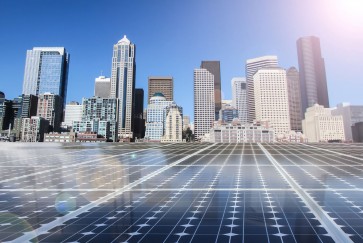Popular Reads
Top Results
Can't find what you're looking for?
View all search resultsPopular Reads
Top Results
Can't find what you're looking for?
View all search resultsIndonesia should focus on renewable energy, not nuclear, activists say
The controversial omnibus bill on job creation may ease the construction of nuclear power plants. The bill would revise a number of provisions in a 1997 law on nuclear energy to streamline regulations controling investments in nuclear energy.
Change text size
Gift Premium Articles
to Anyone
A
ctivists are warning the government to steer clear of building nuclear power plants, citing safety concerns and urging Indonesia to focus on renewable energy instead.
A Greenpeace Indonesia official, Satrio Swandiko, said Indonesia should heed the lessons of the Fukushima Daiichi nuclear power plant disaster in Japan, which was caused by an earthquake and tsunami in March 2011.
Greenpeace's Japan chapter surveyed Fukushima city, as well as the nearby towns of Naraha and Okuma in Fukushima prefecture in October and November 2019. In Fukushima's city center, Greenpeace found at least 45 radioactive hot spots -- 11 of which had radiation levels equal to and even above the Japanese government’s decontamination target of 0.23 microSieverts per hour. It showed that the impact of the nuclear meltdown continued years after the incident.
“Indonesia has a high risk of natural disaster and authorities are lacking in discipline, such as with the recent case of the Batan [National Nuclear Energy Agency] radioactive waste,” Indonesian Forum of the Environment (Walhi) activist Dwi Sawung said on Wednesday. “Building a nuclear power plant in Indonesia is equivalent to activating a time bomb.”
Last month, authorities found radioactive substances in a house in the Batan Indah housing complex, about 5 kilometers from where Batan has several small nuclear reactors it operates for research purposes in South Tangerang, Banten. Police allege that a Batan employee, identified only as SM, had been keeping the radioactive substances at his home for a long time.
Indonesia’s energy policies have indeed been steering away from nuclear plants since then-president Susilo Bambang Yudhoyono issued a government regulation in 2014 that declared such plants “a last resort option” to power the country. The regulation instead prioritizes coal, natural gas and renewables, namely geothermal, solar, wind, hydropower, bio and tidal energy, for electricity production.
But the current controversial omnibus bill on job creation may ease the construction of nuclear power plants. The bill would revise a number of provisions in a 1997 law on nuclear energy to streamline regulations governing investments in nuclear energy.


















